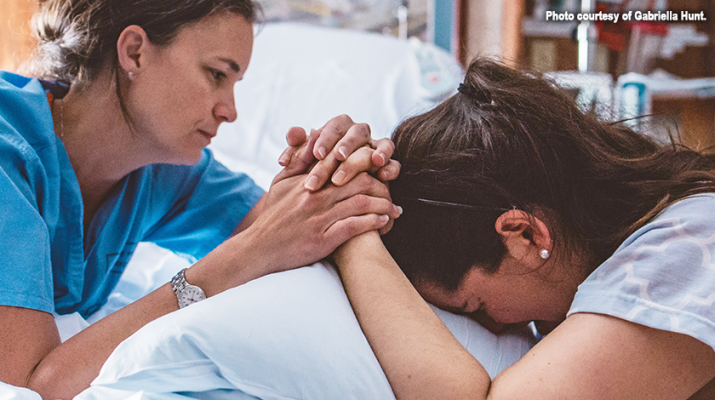By Christine Green

Certified nurse-midwife Rebecca Skovgaard loved night shifts on the maternity floor at Highland Hospital before her retirement from Strong Midwifery at the University of Rochester. The quiet atmosphere allowed her to further bond with the laboring mothers she was working with whether that meant checking on their process, coaching them through delivery or simply sitting by their side.
Skovgaard valued this special time together as two women — one helping the other through one of the most important moments of her life.
A midwife is a health professional trained to care for female reproductive health, specifically during pregnancy, labor and postpartum recovery.
There are many myths surrounding midwifery care in the United States, mostly based on lack of knowledge or driven by fear for the safety of mom and baby.
1. Midwives are untrained or “fake” medical providers: False
The New York State Education Department clearly states that midwives in New York must complete a master’s degree or higher degree program and pass a rigorous licensure test administered by The American Midwifery Certification Board (AMCB).
“We practice evidence based care and are always learning new things through continuing education,” said Heather Lane, another certified midwife with Strong Midwifery.
Certified nurse-midwife Martha Boudakian of Welcome Home Midwifery in Rochester agrees with Lane and noted that much of the fear surrounding midwifery care comes from people, “not understanding the educational pathways we take and the level of training we have.”
2. Having a midwife means you can only deliver a baby at home: False
Midwives agree that homebirth is very safe for low risk, healthy mothers and babies, and many midwives like Boudakian and her colleagues at Welcome Home deliver babies in a home setting all the time.
Rosa Davila of Brockport chose a home delivery when her daughter was born eight years ago:
“Having a midwife allowed me to have the birth I wanted. I birthed at home in three hours with just my loved ones around. It was a loving, empowering experience for all involved. I couldn’t have asked for more.”
But if an expecting mother prefers a hospital birth she can still choose midwifery care. In fact, most midwives in Rochester only deliver babies in a hospital.
Katie Shuknecht of Clarendon went to an obstetrics practice that employed both obstetricians and midwives, but she didn’t expect a midwife to be the on-call attendant at her delivery. It turned out to be a pleasant surprise.
“At first I was nervous at the thought of someone who isn’t a licensed doctor taking care of me at such a serious time. But then when I met her and saw the way she handled the situation with such a calm, encouraging and positive approach. I felt extremely comfortable working with her as she coached me through labor and delivery.”
Still others choose midwifery well before delivery and are glad that their midwife is there to see them through such an important moment in their lives.
Amanda O’Connell of Holley enjoyed having a midwife for prenatal care and at the delivery of her baby girl.
She was grateful to have, “a midwife to listen to my fears, spend time with me (and not feel rushed), and include my husband in on the pregnancy.”
3. Having a midwife attend your birth is unsafe: False.
Midwifery care is a safe option for a great many women and midwives are trained in detailed risk assessment through the entire childbearing cycle from preconception though delivery.
Those women who choose midwifery care in New York can expect to work with highly trained professionals who work closely with patients so that labor and delivery is a safe experience.
If a woman or her unborn child seems to be at any risk during a pregnancy they will work closely with doctors and collaborate, share or transfer care if necessary.
Chrisa Yaeger of Hilton had three very different birth experiences, and it was thanks to a diligent midwife that all births went well, she said. After laboring at home for a time with her first son, Yaeger needed medical intervention and the midwife transferred her to a hospital. Her second child was born at home with the same midwife, and when she developed a serious medical complication during her third pregnancy she had to transfer to a physician.
Yaeger’s midwife recognized when risks arose and employed necessary medical help when needed. The end result were three healthy sons.
Heather Lane assures patients that, “we [midwives] have abilities to do interventions and recognize when things are going off the path.”
“We don’t hesitate to get help with medical complications if you need them,” said Skovgaard.
In fact, in some cases, delivering with a midwife can lower the possibility of medical interventions for low risk mothers. A recent analysis of hospital-level data conducted by researchers at the University of Massachusetts Amherst and the University of Minnesota revealed that hospital births attended by a midwife resulted in overall fewer cesarean deliveries and episiotomies (Journal of Midwifery & Women’s Health, 2017).
“A C-section is not a horrible way to have a baby but you don’t want one unnecessarily,” said Skovgaard who also noted that the current rate of episiotomy at Strong Midwifery is only 1 percent.
4. Midwifery care is only for pregnant women: False
Skovgaard’s oldest patient was in her 80s, clearly beyond the childbearing years. Midwives can care for teens and adults regardless of whether or not they are pregnant. And patients don’t have to have had a baby or even plan to have one. “We help women be in the best health that they can,” she said.
And Boudakian mentioned that while gynecological care is a smaller part of the Welcome Home Midwifery practice, it is a “vital” one that allows her to maintain important longterm relationships with her patients.
Karen Faris of Brighton had her baby with the midwives at Strong 14 years ago and still goes to them for regular care:
“My childbearing years are over but I still use them for GYN services. And all the reasons why I appreciated them during the pregnancy years are still very much in abundance: kindness, compassion and a female centric understanding of how a woman’s body changes over time.”
Intimacy of Care
“People come to us seeking intimacy of care,” said Boudakian. “I like helping a woman find her center, her power, her voice.”
Supporting women, respecting their choices regarding their health and childbirth, and educating their patients on those choices is the foundation of midwifery care. Midwives like Boudakian, Skovgaard, Lane, and their colleagues take this tenant very seriously and find great joy in their work.
Lane sums it up: “It is a blessing to walk with women through their lives and some of their most intimate moments.”

